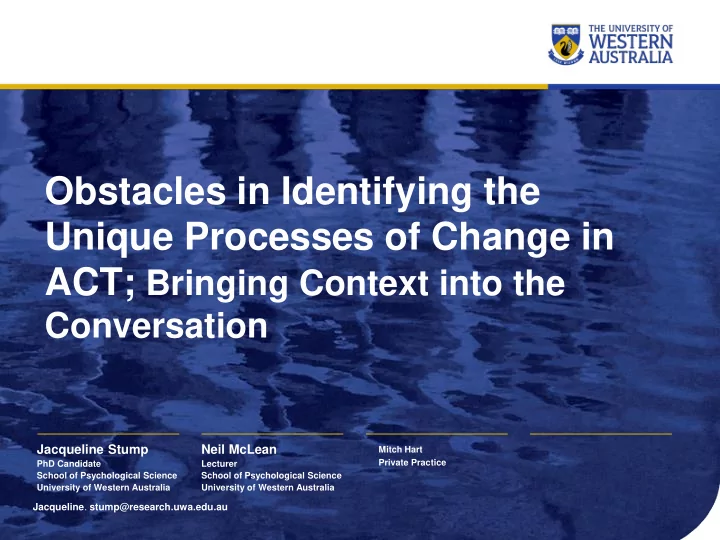

Obstacles in Identifying the Unique Processes of Change in ACT; Bringing Context into the Conversation Jacqueline Stump Neil McLean Mitch Hart Private Practice PhD Candidate Lecturer School of Psychological Science School of Psychological Science University of Western Australia University of Western Australia Jacqueline . stump@research.uwa.edu.au
ACT: New wave or old hat? Ongoing conversation regarding the place that ACT holds in the therapeutic landscape, and its relationship to CBT • New wave • Third wave • Under CBT umbrella Emerging conversation regarding what is ACT • Hexaflex of the six core processes • Psychological flexibility • Constantly growing/changing/evolving
Hayes & Hofmann, October 2017 “In part because of its greater process focus, modern CBT and evidence ‐ based therapy is more open to the investigation of a wider range of approaches from humanistic, existential, analytic, and spiritual traditions. This promises over time to reduce the dominance within intervention science of walled off schools of thought, or trademarked intervention protocols, and to bring different wings of the field together in an evidence ‐ based search for coherent and powerful sets of change processes .”
Expected Themes CBT ACT • Cognitive: Defusion • • Loosening of unhelpful core beliefs Expansion • • More realistic view of the world Connection • • Challenging automatic thoughts Self as context • • Relationship between Values • events/thoughts/feelings Committed action Behavioural: • Activation • Goal Setting • Problem Solving • Testing out hypotheses
Putting it to the Test
Outcomes: Stress Scores (DASS_Stress Subscale) 25.00 ACT 20.00 CBT Mean Stress Scores 15.00 10.00 5.00 0.00 Pre Post Follow up N=62
Outcomes: General Health Scores GHQ 6 5 ACT 4 Mean GHQ Score CBT 3 2 1 0 Pre Post Follow up N=62
Clinical Significance Clinical Significant Change Recovered Improved Unchanged Deteriorated
Process Measures: AAQII AAQII 40 35 ACT 30 CBT Mean AAQII SCore 25 20 15 10 5 0 Pre Post Follow Up
Process Measures: MAAS MAAS 70 60 50 Mean MAAS Score 40 30 ACT 20 CBT 10 0 Pre Post Follow Up
Process Measures: MCQ & DAS MCQ ACT 80 CBT 70 Mean MCQ Score 60 50 40 30 20 10 0 Pre Post Follow Up DAS ACT 160 CBT 140 120 Mean DAS Score 100 80 60 40 20 0 Pre Post Follow Up
Client Diaries Common therapeutic processes Shared CBT ‘umbrella processes’ ACT specific processes?
An argument for general factors?
Two possible explanations There is a difference and we There is no difference failed to identify it • Type II error • Pathways of change between ACT and • Measure selection CBT are more similar than you might • Measure frailty expect • • Therapist factors Unique processes in studies of this • magnitude are extremely well Insufficient treatment length hidden… • Timing/frequency of measure administration Is there a more helpful way of making sense of this?
Apply the filters 1. RFT principles 2. Adaptation into meaningful therapeutic processes 3. Interpretation of processes into ACT experiential exercises 4. Application of ACT based exercises into complete therapy protocol 5. Adaptation for a Stress-based focus 6. Incorporate necessary extra-therapeutic tasks • Consent • Psychoeducation • Homework review • Check-ins etc … 7. Add group processes • Interpersonal differences • Participant preference • Timing & pacing • Dealing with absences 8. Add therapist filter 9. Add contextual factors/individual differences
A breakdown of feedback to the master copy?
Future Directions • Ongoing dialogue between researchers and clinicians • Greater specificity in measures for both models • A more refined understanding of what it means to ‘ACT’ and how that is similar/differs from the CBTers; even if this is a moving target • A more explicit relationship between RFT principles and ACT based techniques • Applications for funding for bigger studies • Continuation of this conversation - An engaged, collaborative interaction at conferences, in books, in publications, and in the lunch room Build bridges if you can ... they are far stronger than walls. -- Steve Hayes.
Jacqueline.stump@research.uwa.edu.au Jacqueline Stump Neil McLean Mitch Hart PhD Candidate Lecturer Private Practice School of Psychological School of Psychological Science Science University of Western Australia University of Western Australia
Recommend
More recommend